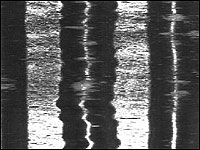 Is a record not spun a record not played? Dragging a needle across old, brittle vinyl records or wax cylinders can damage them — not something you want to do with rare historical recordings. At the Library of Congress, researchers have developed a scanner that can extract audio from records by scanning them digitally – no spinning required. Images are analyzed and transformed back into audible sound. “Stuck” records magically become unstuck, while physically broken records can be pieced back together with great results.
Is a record not spun a record not played? Dragging a needle across old, brittle vinyl records or wax cylinders can damage them — not something you want to do with rare historical recordings. At the Library of Congress, researchers have developed a scanner that can extract audio from records by scanning them digitally – no spinning required. Images are analyzed and transformed back into audible sound. “Stuck” records magically become unstuck, while physically broken records can be pieced back together with great results.
How does it sound? “The machine is not adding its own color. It's not adding anything of its own nature,” says the device's developer. The samples on the NPR site are low-res internet audio, but the comparisons to the original are impressive, despite a persistent viagrapill.com background hiss.
The technology could eventually become available to general consumers, meaning that the daunting task of MP3-encoding piles of vinyl would become way less daunting. It's a strange and beautiful world.
Thanks Jeb
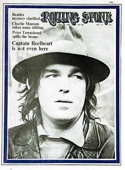 Budding guitarists (hell, all guitarists), take note: Guitar music is church, and there are ten commandments you gotta internalize if you want that axe to say something that will raise souls to the ether. Prophet / spiritual leader / ghost dancer Captain Beefheart, whose voice allegedly once destroyed a $1200 Telefunken microphone, saw (sawed?) through the blues, took them to metaphysical planes, twisted them up in old socks and dish rags, made your spine vibrate with surrealistic pleasure.
Budding guitarists (hell, all guitarists), take note: Guitar music is church, and there are ten commandments you gotta internalize if you want that axe to say something that will raise souls to the ether. Prophet / spiritual leader / ghost dancer Captain Beefheart, whose voice allegedly once destroyed a $1200 Telefunken microphone, saw (sawed?) through the blues, took them to metaphysical planes, twisted them up in old socks and dish rags, made your spine vibrate with surrealistic pleasure. 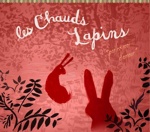
 Les Chaud Lapins, which translates literally as “The Hot Rabbits” or figuratively as “The Super Turned-On Rabbits” (those French are always turned on!), have a new recording –
Les Chaud Lapins, which translates literally as “The Hot Rabbits” or figuratively as “The Super Turned-On Rabbits” (those French are always turned on!), have a new recording – 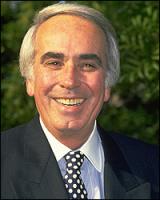 When I think about Tom Snyder, the talk show host who passed away earlier this week, the first thing that comes to mind is his laugh, an old-school guffaw that bordered on self-parody long before Dan Aykroyd made it the centerpiece of a Saturday Night Live routine. Then I think about the eyebrows, twin black caterpillars that gave away his mood just as convincingly as Sam Donaldson’s as he made conversation with guests ranging from
When I think about Tom Snyder, the talk show host who passed away earlier this week, the first thing that comes to mind is his laugh, an old-school guffaw that bordered on self-parody long before Dan Aykroyd made it the centerpiece of a Saturday Night Live routine. Then I think about the eyebrows, twin black caterpillars that gave away his mood just as convincingly as Sam Donaldson’s as he made conversation with guests ranging from  Superficially, the slightly haughty Snyder could come off a bit like the Mr. Jones of Bob Dylan’s “
Superficially, the slightly haughty Snyder could come off a bit like the Mr. Jones of Bob Dylan’s “ The Arctic Monkeys’ reworked version of “Dancing Shoes†with a ridiculously catchy Cuban rhythm, featured on last fall’s Rhythms del Mundo compilation, first seems noteworthy simply for its goofy exuberance. A YouTube
The Arctic Monkeys’ reworked version of “Dancing Shoes†with a ridiculously catchy Cuban rhythm, featured on last fall’s Rhythms del Mundo compilation, first seems noteworthy simply for its goofy exuberance. A YouTube 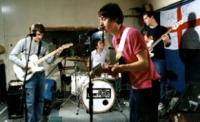 Sadly, the Arctic Monkeys’ plight is representative of a huge, and until now, underreported problem: the threat
Sadly, the Arctic Monkeys’ plight is representative of a huge, and until now, underreported problem: the threat  British musicians fear that warming trends threaten the supply of
British musicians fear that warming trends threaten the supply of 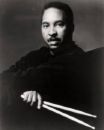
 On the second anniversary of the Hurricane Katrina disaster, I’m posting my New Orleans odyssey, “Listening to the Water.” The soundtrack to the story features Irma Thomas, Mos Def, the Meters, Amerie, Bessie Smith, Randy Newman, and the Dirty Dozen Brass Band, with a special public service announcement from Kanye West.
On the second anniversary of the Hurricane Katrina disaster, I’m posting my New Orleans odyssey, “Listening to the Water.” The soundtrack to the story features Irma Thomas, Mos Def, the Meters, Amerie, Bessie Smith, Randy Newman, and the Dirty Dozen Brass Band, with a special public service announcement from Kanye West.  A friend took his nine-month-old son to the local record store recently, muttering something like “I’ve got to teach him early about the importance of buying music, rather than downloading.” “For copyright reasons or tangibility reasons?,” I asked. “Neither,” he responded, “It’s about getting all the information.” He was talking audio aesthetics — preserving maximum data in the recordings you own, rather than paying for convenience with aesthetically diminished, massively compressed audio. I respect that, but wonder if there will be any CDs left to buy by the time our kids have their own allowances.
A friend took his nine-month-old son to the local record store recently, muttering something like “I’ve got to teach him early about the importance of buying music, rather than downloading.” “For copyright reasons or tangibility reasons?,” I asked. “Neither,” he responded, “It’s about getting all the information.” He was talking audio aesthetics — preserving maximum data in the recordings you own, rather than paying for convenience with aesthetically diminished, massively compressed audio. I respect that, but wonder if there will be any CDs left to buy by the time our kids have their own allowances.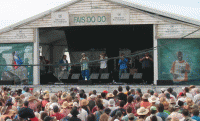
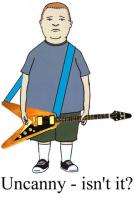 • Suppose your guitar playing and threadbare singing carry such coruscating intensity that concertgoers can hear their ears ringing days later—and this is after your solo acoustic shows.
• Suppose your guitar playing and threadbare singing carry such coruscating intensity that concertgoers can hear their ears ringing days later—and this is after your solo acoustic shows.